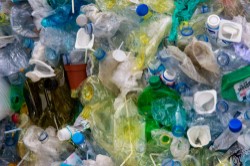 It has recently been reported that the River Thames has a higher level of microplastics than any other river in Europe. Larger items such as wet wipes are even accumulating on the shore and creating wet wipe reefs! Scientists are baffled as to why the problem is particularly bad in London and they are calling for stricter regulations on the labelling and disposal of products that contain plastic.
It has recently been reported that the River Thames has a higher level of microplastics than any other river in Europe. Larger items such as wet wipes are even accumulating on the shore and creating wet wipe reefs! Scientists are baffled as to why the problem is particularly bad in London and they are calling for stricter regulations on the labelling and disposal of products that contain plastic.
Microplastics can come in the form of glitter and microbeads in cosmetics. These enter the water when we wash them off in the sink or shower after use. However, the majority of microplastics come from the breakdown of larger items, such as food packaging and single-use water bottles.
Unfortunately, people also flush things that contain plastic down the toilet without thinking. Wet wipes, cotton buds, dental floss, sanitary products and the masks we have to wear due to the COVID-19 crisis contain plastic and are causing a lot of damage to the environment. These are considered to be unflushables by environmental organisations. We should only dispose of toilet paper in the lavatory and everything else must be binned.
The various species of wildlife that live in our rivers are sadly ingesting these microplastics. Creatures such as crabs have been taken to the Natural History Museum for examination and are found to have stomachs full of plastic fibres. Animals such as birds and fish are also adversely affected and can die.
Research on plastic pollution is often carried out in oceans. An astonishing 12 million tonnes of plastic enters our seas every year! However, an environmental organisation called City to Sea is doing incredible work to combat this. Its mission is to prevent pollution at the source and create a world where everyone connects their actions to our oceans, so all life can thrive.
The bottom line is that we need to take responsibility for our actions. We need to think before we flush certain products down the toilet or use items that are going to easily enter our waterways. By changing our daily habits, we can make a big difference.
City to Sea has recommended 12 ways to reduce plastic pollution. If we continue with behaviour that destroys our natural habitats, we will not be able to enjoy them for much longer. We need to look after our planet, not only for ourselves but also for our children and all the beautiful creatures that live on it.

